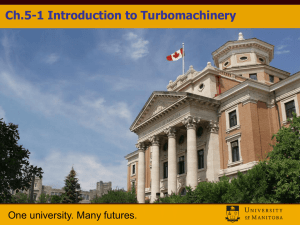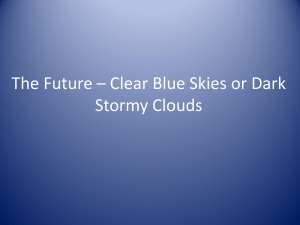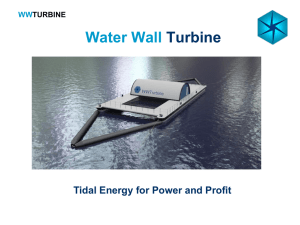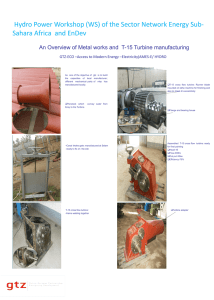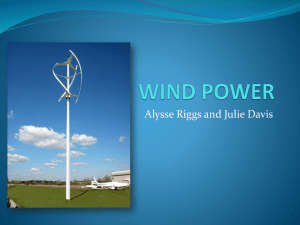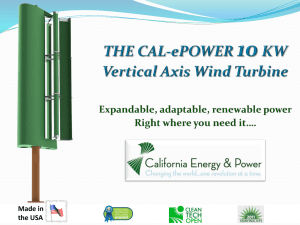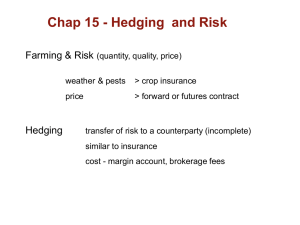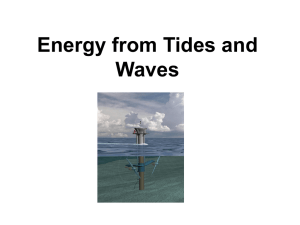Introduction - U. of M. WWW server
advertisement
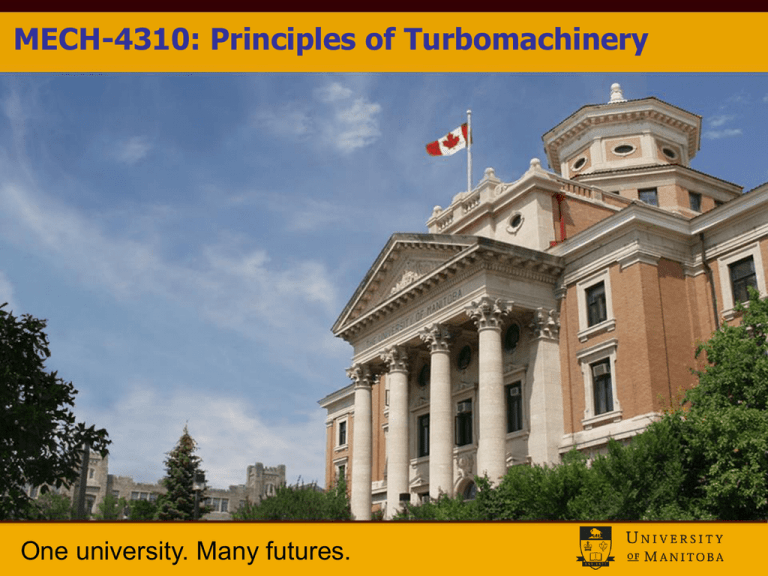
MECH-4310: Principles of Turbomachinery One university. Many futures. Instructor Information Instructor: Email: Tel: Office: Dr. Bing-Chen Wang bc_wang@umanitoba.ca (204) 474-9305 E1-410 There will be one Teaching Assistants (TA), who can also be consulted when you have questions during the course study. One university. Many futures. What is “Turbomachinery” ? “turbo” or “turbinis” is Latin in origin and implies that which spins or whirls around. A turbomachine is a rotating (as opposed to reciprocating) device that extracts energy from or adds energy to fluids. There are two main categories of turbomachines, i.e. • those absorbs power (e.g., pumps, fans, compressors), and • those generates power (e.g. hydraulic, steam, and gas turbines) A turbomachine changes the enthalpy of the working fluids. One university. Many futures. Review: Why “enthalpy”? First Law of Thermodynamics for an open system (based on control volume analysis) 1 2 2 ( h 2 h1 ) (c2 c1 ) g(z 2 z1 ) QW m 2 Therefore, m (h1 h2 ) W What is enthalpy ? h u pv u: internal energy pv: flow work Important: All these parameters (h, u, p, v) are properties of a substance. One university. Many futures. Example 1a (system): Steam Power Plant Siemens Steam Plants (SSP™) Reference: http://www.powergeneration.siemens.com/products-solutions-services/power-plant-soln/steam-turbinepower-plants/ One university. Many futures. Example 1b (system): Steam Turbine One university. Many futures. Example 2a: Tidal Stream Turbine Tidal power is the only form of energy which derives directly from the relative motions of the Earth-Moon system. Tidal power is practically inexhaustible and classified as a renewable energy source. Tidal energy is periodical and predictable. In contrast, wind and solar energies cannot be well-predicted. SeaGen is the world's first large scale commercial tidal stream generator. It is four times more powerful than any other tidal stream generator in the world. Reference: http://en.wikipedia.org/wiki/SeaGen One university. Many futures. Example 2b: Tidal Stream Turbine Click the following weblink: http://www.youtube.com/watch?v=tSBACzRE3Gw&feature=related http://www.youtube.com/view_play_list?p=994CD8692F04FA15 One university. Many futures. Example 3: Turbo Engines Click the following weblink: http://www.youtube.com/view_play_list?p=17E887C02E1576E6 http://www.youtube.com/watch?v=Y0uQzLC851c&feature=PlayList&p=17E887C02E1576E6&index=3 One university. Many futures. Classification of Turbomachines According to the function: • Pumps/compressors Absorbing power • Turbines Generating power According to the flow direction: • Axial-flow turbomachine Flow path parallel to axis of rotation • Radial-flow turbomachine Flow path perpendicular to axis of rotation • Mixed-flow turbomachine Both radial and axial flow components According to the pressure change in a rotor: • Impulse (zero-reaction) turbomachine Pressure changes across the nozzle/diffuser; Pressure does not change across the rotor (or blades). • Reaction (zero impulse) turbomachine Pressure changes across both the nozzle/diffuser and the rotor. One university. Many futures. Example 4a: Centrifugal Compressor Jet engine One university. Many futures. Example 4b: Centrifugal Turbines Turbine and nozzles One university. Many futures. Shaft and turbine Example 4c: Centrifugal Turbomachine Nozzles and turbine blades One university. Many futures. Example 5a: Axial Compressor 4-stage compressor A blade wheel (single stage) Jet engine One university. Many futures. Example 5b: Axial Turbine Axial gas turbine (rotor) One university. Many futures. Wind turbine Tidal turbine Example 5c: Axial Compressor Rotor (To transfer mechanical energy to kinetic energy of gas; to partially increase the pressure.) Stator (To increase the pressure; to transfer kinetic energy to potential/pressure energy.) One university. Many futures. 1 stage = 1 ring of stator blades +1 ring of stator blades Example 6: Impulse Turbines Simplest example Pelton hydraulic turbines No pressure changes across the blades One university. Many futures. Course Outline and Instructor Information • • • • • • • Instructor Information Teaching Methods: Lectures, Labs & Tutorials Policies on Academic Integrity Textbook Requirement and Evaluation Method to Achieve Success Syllabus For detailed explanation, please see the first course handout (Instructor information & Course syllabus). One university. Many futures.
